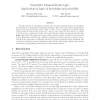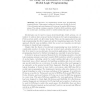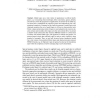9 search results - page 1 / 2 » First-order classical modal logic: applications in logics of... |
TARK
2005
Springer
13 years 10 months ago
2005
Springer
The paper focuses on extending to the first order case the semantical program for modalities first introduced by Dana Scott and Richard Montague. We focus on the study of neighb...
IJCAI
1989
13 years 6 months ago
1989
We Imbed Into a first order logic a representation language that combines atemporal knowledge with time stamps in a hierarchical fashion. Each time structure contains its own chro...
ICLP
2004
Springer
13 years 10 months ago
2004
Springer
We introduce our implemented modal logic programming system MProlog. This system is written in Prolog as a module for Prolog. Codes, libraries, and most features of Prolog can be u...
KI
2008
Springer
13 years 4 months ago
2008
Springer
Abstract. Modal logics see a wide variety of applications in artificial intelligence, e.g. in reasoning about knowledge, belief, uncertainty, agency, defaults, and relevance. From ...
RSCTC
1993
Springer
13 years 9 months ago
1993
Springer
This paper focuses on the application of rough set constructs to inductive learning from a database. A design guideline is suggested, which provides users the option to choose app...



